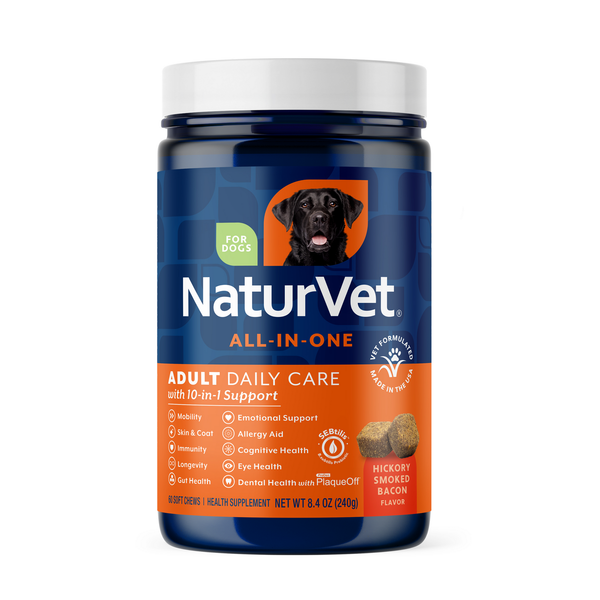Dog Vitamins and Supplements: Which is right?
Vitamins and Supplements
Dog vitamins and supplements are extremely popular. There’s so many out there! But what constitutes a vitamin and what constitutes a supplement? Do supplements need a prescription and in what cases might my pooch need one? Before we get into some specific supplements and when we might consider them, let’s take a few moments to answer some of these questions.
A Supplemental Question
A dietary supplement is intended to do just that: supplement the diet. It typically contains one or more of the following: a vitamin, a mineral, a fatty acid, a botanical like an herb, an amino acid, or an enzyme. You can also define a supplement by what it isn’t: a food, preservative, or pharmaceutical drug. Supplements can consist of either the natural product itself, or as a synthetic version.
The term vitamin is sometimes used in a more general sense to describe a health supplement (which may contain one or more actual vitamins) for your dog. Vitamins themselves are always organic compounds (as opposed to a mineral like Copper), are essential for normal growth and nutrition, and are required in small quantities in the diet because they can’t be made by the body. Most Vitamins have a letter designation, like A, B12, and E.
So how is a drug different? Well, the FDA considers drugs to be something other than food that affects the structure or function of the body. Drugs are also intended for diagnosing, treating, or preventing a disease.
Dietary supplements by contrast, can’t be labeled as treatments or cures for specific diseases, and can’t claim to alleviate symptoms of a particular disease process. Supplements also cannot legally be reviewed or considered as drugs. As such, supplements don’t require prescriptions and can be purchased just about anywhere.
So if that’s true, how are supplements regulated and how can I tell if they’re safe?

Safety, Regulation, and Meeting a Higher Standard
The main government body involved with policing supplements is the Food and Drug Administration (FDA). The Federal Trade Commission has a smaller but very important role in reviewing the validity of any televised or broadcast advertisements.
Now, unlike drugs, supplements don’t require government approval to be made or sold. And this is an important point we’ll return to. The law doesn’t require that supplements be considered safe prior to release into the market and it also doesn’t require label claims to be proven accurate or truthful prior to release. But this changes once a product is released. The FDA then has authority to review the product, its label claims, and review any adverse events that have been reported.
So what does this mean for you?
If your friend tells you about a brand new dietary supplement for dogs that is supposed to say, cure cancer, you should not jump online immediately, buy it, and start feeding it to your pooch. A healthy dose of precaution is important.
This is why you’ll hear me say many times, to always consult with your veterinarian prior to starting any new supplements for your pup. If you come across something new that your friends are raving about, email or call your vet and ask for an opinion. Your vet will be able to look up the supplement, its ingredients, and compare the purpose of the product to your pup’s medical needs.
Now while the government itself cannot control how supplements are manufactured and released onto the market, there is a non-governmental body that helps promote quality control. The National Animal Supplement Council is established for the purpose of maintaining the integrity of the animal health supplement industry. It promotes safety, accuracy, and quality of pet supplements.
NASC members are subjected to very high standards, including independent audits of their production facilities. Supplement manufacturers are not required to be NASC members or to comply with NASC standards. This is why you should always look for supplements bearing the NASC Quality Seal, because it means the manufacturer has gone above and beyond to make sure they are providing a quality product.
And now that we’ve covered some the important basics of supplements, let’s jump into our 5 common supplements and how to consider them for your pup.
The Cartilage Collaborators: Glucosamine and Chondroitin
Glucosamine, often paired with chondroitin sulfate, is designed to supplement joint health. Glucosamine and chondroitin are both natural components found in joint cartilage. While it’s true that evidence-based studies are up and down about glucosamine’s efficacy for arthritis, enough anecdotal reports of benefit are out there to make glucosamine/chondroitin one of the most frequently recommended dog supplements.
When is it appropriate to consider a glucosamine/chondroitin supplement? Definitely if you feel you’re seeing some of those “older age” changes in your pup, like taking the stairs a little slower or appearing stiff when standing. But you shouldn’t always wait until you see active joint concerns before considering glucosamine/chondroitin. If your pup has had an orthopedic injury, like a cruciate ligament tear, or if he’s a breed at risk for hip problems later in life, ask your vet about starting a joint health supplement when he’s young. It could be a good preventative measure.
While glucosamine and chondroitin can be beneficial for joint health, results can vary for each individual pup. Don’t have the expectation that you’ll see dramatic improvement for severe orthopedic pain. In these cases, there are additional treatments for joint pain and orthopedic illnesses, that can be discussed with your vet.
A Delicate Balance: Omega Fatty Acids
Omega fatty acids are pretty vital nutrients. Omega-6 fatty acids are pro-inflammatory, which is actually important and needed by the body, but excesses can be problematic. Because omega-3 fatty acids are generally anti-inflammatory, a roughly equal balance of the two is necessary to keep things in equilibrium. But while omega-3’s are found in only a few select dietary sources, omega-6’s are found in abundance, shifting that special balance for many dogs to one of pro-inflammation.
Fish oil is very rich in omega-3 fatty acids. With anti-inflammatory properties, fish oil can be beneficial for a healthy skin and coat, as well as joints. While human fish oil supplements are safe for dogs, fish oil comes in many formulations just for dogs too. Because dosing can vary depending on the reason for use, always make sure to discuss this with your vet before starting.
Staying Regular: Probiotics
As you may know, our pups can have very sensitive gastrointestinal tracts. This can result from so many underlying causes, but one of these can be bacterial overgrowth. Now, while it’s hard to know what is specifically best for each individual dog, we generally do know that a healthy balance is required between appropriate, commensal bacteria populations.
If something occurs to make intestinal bacterial populations get out of balance, inflammation for example, then we can see continued gastrointestinal issues. Enter the concept of probiotics. Probiotics contain several strains of good commensal bacteria to help keep population balance in check. This can especially be important if a pup has been on antibiotics for a medical condition, or any GI disease which might upset the balance.
Don’t expect probiotics to be the “golden ticket” to solve your pup’s GI problems, but they can be considered as one portion of a comprehensive treatment approach to vomiting and diarrhea.
The Calming Amino Acid: L-theanine
L-theanine is an amino acid that has shown some benefit for dogs with anxiety in promoting a calming effect. The Journal of Veterinary Behavior has published a couple studies on use of l-theanine, finding improvements in dogs suffering from noise phobia, thunderstorm anxiety, and fear of unfamiliar humans. In all three cases, l-theanine has been suggested as a component to a behavioral therapy plan.
Now, again, I would not consider L-theanine to be the ticket to fix anxiety or stress, but is worth considering as part of a comprehensive approach to behavior. Throwing supplements or even medications at behavioral problems alone are unlikely to solve the behavior without incorporating a behavior modification approach. This is why it is so important to consult with your vet about any behavioral concerns and to get recommendations for in-home trainers and veterinary behaviorists in your area.
The Radical Scavengers: Antioxidants
The main benefit of antioxidants is to scavenge free radicals. Free radicals are orphaned atoms that are inherently unstable, looking for something to bond with. In their fervor to bond with molecules, they can damage cells. Antioxidants scavenge, or “suck up” these free radicals from the body and in theory promote health and wellness by reducing cellular damage.
A 2004 article on DVM360, a veterinary professionals site, discussed the importance of antioxidants in a pet’s diet. Some common antioxidants include Vitamin C, Vitamin E, Selenium, and Carotenoids (as found in carrots and tomatoes). It’s important to note that dogs (and cats) unlike humans and guinea pigs, can synthesize their own Vitamin C. However, high performance dogs may still need supplementation.
Antioxidants show promise but be cautious with your expectations when considering them and discussing their use with your pup’s doctor. Expecting an antioxidant supplement to treat or fully prevent cancer, for example, is not a realistic expectation to have. But they certainly are of benefit and in small ways can improve overall health by cutting down on an underlying source of disease.
Mellowing the Mood: Melatonin
Melatonin is a naturally occurring neurohormone that aids the body by telling it when to sleep. You might have heard of it, as many people with sleep disorders take a melatonin supplement to help them snooze.
In dogs, there has been some efficacy shown using melatonin for anxiety, especially with fireworks and thunderstorms. A case study was published in the Journal of the American Veterinary Medical Association, that demonstrated about an 80% success rate. And while it typically doesn’t knock dogs out the way it can zonk a person, it can help a dog who is restless at night by calming him down (and thus helping you to sleep).
You may consider a melatonin supplement if your dog exhibits situational anxiety, separation anxiety, and sleeping difficulty. But because dosages may vary depending on the intended use, consult your vet first before starting. And just like with l-theanine, if your dog is suffering from a behavioral disorder, it’s important to concurrently seek a behavior modification strategy.

Don’t Go It Alone
Supplements are great! Please consider them. I have seen them provide benefit in practice. It’s just important to remember that results can vary depending on what’s going on and also to realize that supplements are often only one component of a comprehensive approach to therapy.
Chat with your vet prior to starting any new supplement. Sometimes, a dog’s diet is already appropriately supplemented with omega-3 fatty acids, for example, and adding more will be of little benefit. It’s also a good idea to have your vet look at ingredients on a new supplement label, especially if you’re not sure what it contains.
Lastly, there are situations where supplementing can be harmful. For example, while calcium supplements are common for humans, dogs rarely need calcium supplements. Over-supplementing calcium in a growing dog can actually lead to bone growth abnormalities. This is why you should not just assume that what’s good for you is good for your pup and why it’s so important to have a good relationship with your pup’s vet. Together, you can make sure a new supplement is a safe and healthy choice.
JOIN OUR PACK
Follow us @NaturVet on social media to fill us in on any tips we might have missed. And, check out the rest of NaturVet.com. We’ll keep you up to date on all our latest pet resources, supplements, tips and tricks, and more – everything you need to be the best pet parent possible.
























